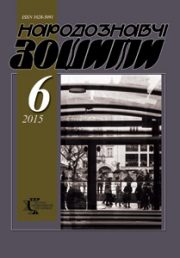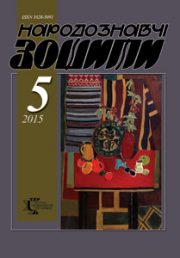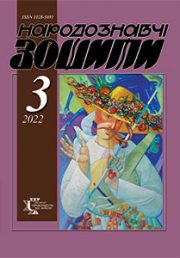The Ethnology Notebooks. 2024. № 6 (180), 1753—1764
UDK 94-028.16:355.48(470+571:477)”2014/2015″
DOI https://doi.org/10.15407/nz2024.06.1753
BODNAR Halyna
ORCID: http://orcid.org/0000-0002-7972-8111
Candidate of History, Associate Professor,
Ivan Franko National University of Lviv,
Mykhailo Hrushevsky Chair
of Contemporary History of Ukraine,
1, Universytetska Str., 79000, Lviv, Ukraine,
Contacts: e-mail: halyna.bod@gmail.com
Abstract. Introduction. In 2014—2015, Ukrainian oral historians faced the challenge of documenting testimonies of the ongoing Russo-Ukrainian war. The story we are engaged in recording may have a beginning, but it is still unfolding and has no clear end. The records of the recent events distinguish Ukrainian oral history, making it unique in the region and the world generally; thanks to them a unique source basis is currently being formed for future memory studies.
The relevance of this article is determined by the possibility of analyzing the collected and archived source material about the experiences of the Russian war in Ukraine since 2014. In the article, I will draw attention to the beginning of the war (2014—2015) in oral history recordings with mobilized soldiers, volunteers, and military personnel. In spring 2022, people went en masse to the military recruitment centers and joined the Territorial Defense units. Many volunteered for war, as in spring of 2014. They are going through a similar path — the path of a person who went off to war, is coping with it and will have to return to civilian life.
The purpose of the proposed investigation is to analyze the narrative representations of the experiences of the beginning of the Russian war in Ukraine (2014—2015) in the oral histories of Ukrainian soldiers. As a researcher of oral history, I do not aim to reconstruct the war experience, but rather focus on the content, i. e., on what was exactly told, what was in the spotlight of the narrative attention, what and why, on the contrary, remained unspoken, as well as what the forms and narrative strategies of the stories were, i. e., how they were told.
The object of the research is the experiences of Ukrainian soldiers about the beginning of the Russo-Ukrainian war in 2014—2015, and the subject — testimonies of soldiers, collected by the method of oral history. The methodological basis of the research is oral history as a method based on personal interviewing, which makes it possible to understand meanings, interpretations, subjective experience, and as a historical source for narrative analysis.
Conclusion. The analysis of the oral history interview as a holistic story allowed arriving at several important conclusions about the methodology of oral history of war and narrative representations of war experiences in recordings with combatants. The in-depth semi-structured thematic interview method did not work in the recordings with the soldiers. The narrators opened up not at the beginning of the conversation in the introductory narrative part, but later in the answers to the questions. The narrative representations concerned primarily the eve of the war, the first combat experience and especially the life after the demobilization, (non)return to civilian life and the present time.
Keywords: war experiences, Russo-Ukrainian war, Ukrainian soldiers, oral history, narrative analysis.
Received 23.11.2024
REFERENCES
- Shtohrin, I. (Ed.). (2016). AD 242 (Donetsk Airport). A Story of Courage, Brotherhood, and Self-Sacrifice. Kharkiv: Klub Simejnoho Dozvillia [in Ukrainian].
- Hlotov, S. (Ed.). (2018). In the Fiery Ring. The Defense of Luhansk Airport. Kharkiv: Folio [in Ukrainian].
- Kilar, A., Pikulyts’ka, Kh. & Bulka, S. (2021). Warriors of Light: The University and the War (Part 1). L’viv: Instytut narodoznavstva NAN Ukrainy [in Ukrainian].
- Podobna, Ye. (2018). The Girls Cut Their Braids. A Book of Memories. Kyiv: Liuta sprava [in Ukrainian].
- Zinenko, R. (2017). Ilovaisk Diary. Kharkiv: Folio [in Ukrainian].
- Kharchenko, H. (2019). Artilleryman’s Diary. Kharkiv: Folio [in Ukrainian].
- Moroko, V., Moldavs’kyj, R. & Bilivnenko, S. (Ed.). (2015). Oral History of the Russo-Ukrainian War (2014—2015) (Issue 1). Kyiv: K.I.S. [in Ukrainian].
- Vasyl’chuk, H., Moroko, V. & Moldavs’kyj, R. (Ed.). (2016). Oral History of the Russo-Ukrainian War (2014—2016) (Issue 2). Kyiv: K.I.S. [in Ukrainian].
- Mil’chev, V., Moroko, V. & Moldavs’kyj, R. (Ed.). (2017). Oral History of the Russo-Ukrainian War (2014—2016) (Issue 3). Kyiv: K.I.S. [in Ukrainian].
- Moroko, Vl., Bilivnenko, S. & Moroko, Val. (Ed.). (2018). Oral History of the Russo-Ukrainian War (2014—2016) (Issue 4). Kyiv: K.I.S. [in Ukrainian].
- Moroko, Vl., Bilivnenko, S. & Shtejnle, O. (Ed.). (2019). Oral History of the Russo-Ukrainian War (2014—2016) (Issue 5). Kyiv: K.I.S. [in Ukrainian].
- Bodnar, H., & Makhovs’ka, S. (Ed.). (2024). Oral Testimonies of Soldiers of the Beginning of the Russo-Ukrainian War (2014—2015): Challenges in the Research Phase. In: S. Makhovs’ka. War, Science and Emotions: (Un)spoken. Collection of the International Workshop Materials (Chernihiv, 21—22 February 2024) (Pp. 76—87). Kyiv: Yurko Liubchenko [in Ukrainian].
- Pryvalko, T. (Ed.). (2018). Maidan in the First Person. The Regional Dimension. Lviv —Chernihiv Regions (Issue 3, part 2). Kyiv: K.I.S. [in Ukrainian].
- Arkusha, O., & Lytvyn, M. (Ed.). (2018). On Dignity. Volunteer Movement in Ukraine 2013—2017. Lviv [in Ukrainian].
- State Border Guard Service of Ukraine. (2014, 4 june). Luhansk Border Detachment Relocated. Retrieved from: https://dpsu.gov.ua/ua/news/lyganskij-prikordonnij-zagin-peredislokovano/ (Last accessed: 14.08.2024) [in Ukrainian].






